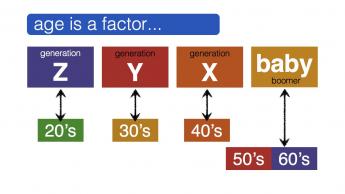Related Topics
Old Age, Re-designed
A grumpy analysis of future trends from a member of the Grumpy Generation.
Newspapers

|
| Times Generation X, Y, or Z |
Amidst the 2009 depression, newspapers got more expensive but thinner, thus tempting readership into a downward spiral. We hear the generation under thirty scarcely notices newspapers, except for comic pages and sports sections. Kids never were much interested in news, as I discovered at age 15. Time Magazine sponsored prizes for the best score on current events to test at that time; I won it in my school by being the only student who bothered to take the test. Later, I even had to do a lot of arguing to compete with boys clustered around the radio, listening to such timeless music as Amapola , just to find out what had happened at Pearl Harbor. Within two years, several of those boys had been killed in the war that began for us that December day. Whether the news is covered by TV, the blogosphere, magazines or newspapers, kids are not now and have never been much interested in news. Those polls and surveys bemoaning the condition of Generation X, Y or Z don't prove very much. In fact, if you want my opinion, all age groups of the American culture have always been astonishingly oblivious to news. When Franklin Roosevelt won landslide election victories in spite of almost universal opposition by newspaper editorials, it astonished the newspaper columnists but didn't surprise me at all. Americans don't pay much attention to the news, never have.
 Newspapers are central to the life of retirement. 
|
Toting a hundred morning newspapers in the dark hours before school began, it was painfully obvious to my adolescent muscles that newspapers were thick (and heavy) on Fridays, pathetically thin on Saturdays, and although the weekly cycle persisted, grew unbelievably heavy between Thanksgiving and Christmas, thin and anemic after New Year's. What seems to excite reader interest is an advertisement, opening a chest of dreams for the hopeful, plus maybe suggestions to those who are desperate for gift ideas. The generation of my parents read Sears, Roebuck catalogs, my own generation grown adult read the ads back among the brassiere ads. The coming generations get their dream fulfillment -- from electronic gadgets rather than the printed page, but their interest in news is no less, it couldn't be. A major feature in the decline of newspaper revenue was the almost instantaneous transfer of want-ads to the Internet. The shocked newsrooms are discovering that advertisements not only subsidized the news, but they also generated much of the readership.
For the people in retirement, however, newspapers do provide the news. Retirees read the papers, think about the editorials, begin their conversations with allusions to today's big news stories. Television tells you what is news, but the newspapers make you current events conversationalist. Every retired person wants to engage in brief banter about some movie star who died, but the retirees -- mostly male -- who want to express opinions about the affairs of the world, are accustomed to shaping those opinions by reading the papers. You can't maintain your self-image as a local leader when you don't have a clue. And since retirees have time to read but commuters mostly don't, interpreting the news is a function which maintains generational authority.

|
| Newspapers |
Because big papers can afford bigger newsrooms, urban retirees typically maintain dominance over country cousins. People who live in the big city know what's what, while retirees who wander around small towns have to rely on their wits, small-time. The steady disappearance of urban newspaper competition led to the complaint that the press was biased. But the disappearance of newspapers entirely is too threatening to social relationships to be tolerated without searches for substitutes.
You would think the newspapers would mount better self-defense than they have; right now, only 16% of retired males are comfortable using a computer. The rising generation is something else, of course, so there might be a ten-year window for the newspapers to regroup and respond. However, it looks as though they waited too long. The New York Times was worth $10 billion six or seven years ago, now is only worth one billion. The Sulzberger family doesn't own it all but have surely lost 90% of their investment, and must be looking to their family security rather than gamble their pittance on saving the paper. The Bancroft family took their billion and ran, leaving it to Mr. Murdoch to worry about new frontiers for the Wall Street Journal. Just about every other family-dominated newspaper has passed into the hands of absentee generations. If a feisty young newspaper heir is going to become Sir Galahad, he better get started soon. The retiree grandparents, out on the golf course, demand no less.
Originally published: Monday, June 29, 2009; most-recently modified: Wednesday, May 29, 2019
| Posted by: followers exchanege | Feb 13, 2012 9:49 AM |
| Posted by: cheapoair promo code | Feb 13, 2012 9:27 AM |
| Posted by: esalerugs promo code | Feb 13, 2012 9:06 AM |